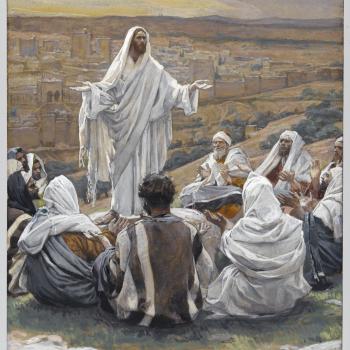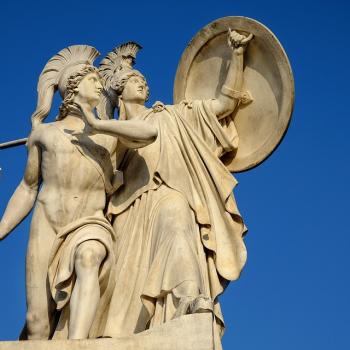 “What a long way it is between knowing God and loving him!” (f. 377)
“What a long way it is between knowing God and loving him!” (f. 377)
Ultimately, Pascalian spirituality is about that “long way.” Pascal wrote to an audience that was full of knowing about God. A thoroughly Christianized society, shaped by the rhythms and rituals of Christian practice, trained at least nominally in Christian truth, even sharply fractured by variations in Christian doctrine—this is not a culture that needed “evangelization” as we normally think of it. But loving God? Ah, there seems to have been a dearth of that great wonder.
To change that knowledge of God into love of God was the Pascalian challenge of faith, as it it is ours today. Pascal was adamant that knowledge of God was not faith, for it had not reached le coeur; it was not a knowledge of the “third order.” And yet, the dilemma is that we cannot produce this knowledge on our own. It is gift. Here, again, is that important passage:
The Christians’ God is a God who makes the soul aware that he is its sole good: that in him alone can it find peace; that only in loving him can it find joy: and who at the same time fills it with loathing for the obstacles which hold it back and prevent it from loving God with all its might. Self-love and concupiscence, which hold it back, are intolerable. This God makes the soul aware of this underlying self-love which is destroying it, and which he alone can cure. (f. 460)
So there we are—trapped in the darkness of our own self-love, and needing the divine cure. Powerless? Yes. Helpless? No.
Let’s draw again on an Old Testament account—this time that of Elijah and the prophets of Baal (1 Kgs. 18.22-39). Only the fire from heaven would suffice, and Elijah could not produce that. No one can. But Elijah still had work to do: build the altar, lay it with wood, dig the trench, prepare the sacrifice. And then pray. Note this part of his prayer: “Answer me, Lord, answer me, so these people will know that you, Lord, are God, and that you are turning their hearts back again.” It was their hearts that needed the revelation.
This is the work of make believe. Not imaginary wish-fulfillment, but an intentional, directed work of setting up an altar in your heart and praying for the fire of God to descend and turn le coeur.
Of course, we no longer need stone and wood and slaughtered oxen. What do we need to prepare something for the fire of God to consume?
Pascal, with all the Christian spiritual writers through the ages, are clear about the movements that are most combustible. We call them spiritual disciplines, and there are many that are useful, but—to my mind—there are only four that are indispensable, and that all other spiritual disciplines enhance and support.
Prayer. We begin with something most fundamental in our prayers: incline my heart. And out of a prayer like that, a prayer of utter dependency, utter humility and honesty, comes a fullness of attitude toward God. Prayer is the “channel” of salvation; we won’t be “saved” because of how well or how much we prayed, but prayer makes possible what will save us—intimacy with Christ. As one spiritual writer has put it:
In prayer we begin to see ourselves as God sees us and we see God as he is. In prayer we acknowledge that we are not in control. This is simply acknowledging a basic fact of our existence. Not to pray is to take destiny into our own hands, to falsify our true self as dependent creatures and to deny God as the Sovereign One. (Simon Chan)
Scripture. Pascal’s Pensées is full of scripture—arguments about the power of the prophecies and the miracles, the compelling drama of God’s revelation that culminates in the life, teaching, and atoning work of Jesus Christ. “We know God only through Jesus Christ. Without this mediator all communication with God is broken off. Through Jesus we know God. . . . In him and through him, therefore, we know God. Apart from that, without Scripture, without original sin, without the necessary mediator, who was promised and came, it is impossible to prove absolutely that God exists…” (f. 189). Scripture feeds the knowledge of God that can generate love of God. “The sole object of Scripture is charity” (f. 270). We remember the words of the disciples who had encountered Jesus on the road to Emmaus as they recollected his teaching: “Were not our hearts burning within us while he talked with us on the road and opened the scriptures to us?” (Lk. 24.32) You want your heart to burn? Feed it with the teachings of Jesus, who himself drew on all the scriptures.
Worship. Pascal urges this practice, in its most 17th-century incarnation, when he describes those who have been “cured of the affliction of which you wish to be cured … They behaved just as if they did believe, taking holy water, having masses said, and so on” (f. 418). Desperately longing for a faith they could not experience, they kept the rhythms and rituals of worship. So, here I am a 21st-century Evangelical-Anglican-Catholic-something-or-other, and I don’t take holy water or have masses said. But this business of entering into the acts of worship—corporate gathering and praise, creeds, songs, prayers, and most importantly, Eucharist—shapes and has shaped and ever will shape the people of God. Again, those disciples headed to Emmaus found their eyes opened—faith kindled, hope renewed—when Jesus broke bread with them. “When he was at the table with them, he took bread, gave thanks, broke it and began to give it to them. Then their eyes were opened and they recognized him” (Lk. 24.31)
Community. When the fire of God descends from above, Elijah finds himself feeling quite alone and abandoned. And yet the word of the Lord redirects him to the 7,000 who, like him, have remained faithful to the Lord (1 Kgs. 19.18). The disciples from Emmaus, fresh from their experience of adoration, rush back to the community. There we share both our encounters with Christ, and we hear about others’ encounters with Christ. Some of us, like Thomas on that first Easter evening, miss out, and we can only hear the testimonies of others. And while we’d like to follow up that missed opportunity with a personal face-to-face, our Lord himself commends those of us “who have not seen and yet believed” (Jn. 20.29). That’s what community is for.
Listen to Pascal’s heartfelt musing on community and its role in his faith:
I love all men as my brothers, because they are all redeemed.
I love poverty because he loved it. I love wealth because it affords me the means of helping the needy. I keep faith with everyone. I do not render evil to those who do evil to me, but wish them a condition like my own, in which one receives neither good nor evil at the hands of men. I try to be just, genuine, sincere, and loyal to all men, and I feel special affection for those to whom God has most intimately joined me.
And whether I am alone or in the sight of others, in all my doings I am in the sight of God, who must judge them and to whom I have devoted them all.
These are my feelings.
And all the days of my life I bless my Redeemer, who implanted them in me and who made a man full of weakness, wretchedness, concupiscence, pride, and ambition into one free from all these evils, by the power of his grace, to which all glory for this is due, since nothing but wretchedness and error come from me. (f. 931)
Consider Jesus Christ in every person, and in ourselves. Jesus Christ as father in his father, Jesus Christ as brother in his brothers, Jesus Christ as poor in the poor, Jesus Christ as rich in the rich, Jesus Christ as priest and doctor in priests, Jesus Christ as sovereign in princes, etc. For by his glory he is everything that is great, being God, and by his mortal life he is everything that is wretched and abject. That is why he took on this unhappy condition, so that he could be in every person and a model for every condition of men. (f. 946)
I think I’ve come to an end with our Neo-Pascalian pursuit, at least for now. His spiritual contributions to my own journey have been immense, and perhaps you too have been in-spired, that is, breathed into with a longing for God in new ways.
If my words please you and seem cogent, you must know that they come from a man who went down upon his knees before and after to pray this infinite and indivisible being, to whom he submits his own, that he might bring your being also to submit to him for your own good and for his glory: and that strength might thus be reconciled with lowliness. (f. 418)
Photo courtesy Tennessee Wanderer Flickr C.C.
___________________
Note to Reader: This series on Becoming Neo-Pascalian considers some of the ways Blaise Pascal (1623-1662) speaks into the 21st century. It draws from my own research, published in Beyond the Contingent (2011), and citations are from the book, unless otherwise noted. The beginning of the series is here: Introduction.












